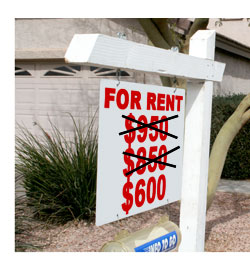Rick Dryer: Gary, we both have studied property markets for years and we’ve arrived at this scientifically proven conclusion: Vacancies suck!

Gary Eldred: You’re so right. When we offer a unit that no one wants to rent at the price we are asking, that’s bad. When tenants line up to rent from us, that’s good.
Rick Dryer: It’s amazing that so many property owners do not understand why some rentals accumulate lengthy tenant waiting lists while other properties beg for applicants and experience more turnover than a ferris wheel at an amusement park.
Gary Eldred: I know what you mean. Many times I’ve heard landlord acquaintances complain about the “lousy market” or the “poor tenant pool.” Yet, while they are blaming and complaining, my properties were filled with high quality tenants.
Rick Dryer: Gary, sometimes we must remind would beinvestors of the obvious: Property owners operate in a strongly competitive marketplace. Just pick up a local newspaper and thumb through the rental ads. In even relatively small cities, potential tenants can choose from among hundreds of “for-rent” homes and apartments.
To end vacancies forever, you’ve got to offer the units that tenants prefer. To know what tenants prefer, you must get into their minds. And you must get into the properties of your competitors. To outperform competing properties, you need to understand both their favorable features as well as their weak points.
Gary Eldred: That’s how your operation impressed me when I first looked at one of your Right Place blessed rental subdivisions and talked with your research staff. You didn’t just choose the right area to develop and build, you designed your rental product with attention to tenant preferences. In fact, you could call your projects “ Right Place, Right Time, Right Product, Right Price.” You blended location, features, and rent levels in such a way that your competitors could only choose from the tenants you turned away.
Rick Dryer: Thank you. That’s quite a compliment.
Gary Eldred: Of course, you know that I liked your approach so well because you practiced the same principles and ideas that I have practiced, taught and written about for years.

Rick Dryer: I call it Right Place. You call it PVP.
Gary Eldred: Yes. PVP stands for “Preferred Value Proposition.” To succeed in any type of business, figure out how to structure your value proposition (location, property features, amenities, lease terms, security deposit, rent level) in such a way that it offers tenants the deal they will choose (prefer). At the same time the deal gives you a good return on your investment (profit margin).
Rick Dryer: As I see it, owners often err in one of two ways. They pay too little attention to what their potential tenants want and thus end up offering an inferior product.Or they go all out with granite countertops, Jacuzzis, or whatever other fabulous features look appealing. Even though potential tenants love the unit, they’re not willing (or able) to pay enough to make those amenities pay off for the investor. Having missed the boat in the product one way or the other, they then have to keep lowering rents to get tenants to react, further shooting themselves in the foot.
Gary Eldred: How do Right Place Right Time™ believers get the market knowledge necessary to strike the right balance?
Rick Dryer: We do just what you advise in your books. We read the latest property studies and reports. We survey potential customers. We solicit feedback from our current tenants. We keep prospect and sales records. We shop and compare competing properties. We experiment. We find out what works. Then we try to always improve. To come up with something better—for us and the potential tenants.
Gary Eldred: People who follow your Right Place Right Time™ principles have projects sell out and rent up fast. Want to come and speak to my classes the next time I decide to put my professorial hat back on.
Rick Dryer: Sure, my pleasure. 
Gary Eldred: I’ll hold you to that.
Rick Dryer: Here’s another point I want to emphasize. At our Right-Place, Right Time™ Seminars, attendees often ask me questions such as: “Should my rental properties include a garage?” “Should I require a first and last month’s deposit?” “Is it better to include a deck or maybe a patio?”
Gary Eldred: I receive similar “Is it better to do ‘this’ or ‘that’?” types of questions. I’ll bet you answer the same way I do.
Rick Dryer: Right you are. We both answer “It all depends” because, in fact, it does.
Gary Eldred: Owners need to continuously monitor the market and adapt not only
to ever-changing tenant likes and dislikes, but also changes in the quantity and quality of competitors.
Rick Dryer: Right. The best strategy depends on the target market. The features they prize most highly, what competitors are offering, and how much your market is willing and able to pay.
Gary Eldred: In your experience, have you found any near constants? In terms of features.
 Rick Dryer: For the target markets we serve, our feedback tells us that most people like newer properties because newer properties incorporate modern features. We found that renters prefer two or three bedrooms and at least two or two and a half bathrooms. They like upgraded appliances—not necessarily Subzero or “Titanium”—but surely something several steps up from your econo-basic models. That works for the renter and the owner, because newer means many headache free years of ownership. Nice window treatments are important, too. No renter wants to have to invest in a landlord's blinds. Rick Dryer: For the target markets we serve, our feedback tells us that most people like newer properties because newer properties incorporate modern features. We found that renters prefer two or three bedrooms and at least two or two and a half bathrooms. They like upgraded appliances—not necessarily Subzero or “Titanium”—but surely something several steps up from your econo-basic models. That works for the renter and the owner, because newer means many headache free years of ownership. Nice window treatments are important, too. No renter wants to have to invest in a landlord's blinds.
Gary Eldred: Rick, we agree on another near constant also, incorporating a lot of this. Your students and clients call it the rent-ready package. With today’s hectic lifestyles, people don’t want a plain-Jane unit that requires a couple of days of shopping at Wal-Mart or Sears just to make the unit a home.
Don’t force potential tenants to imagine what they could do with the unit.
Instead, entice your tenants with a living environment that’s easy to move into immediately and picture perfect.
Rick Dryer: Absolutely. Don’t force potential tenants to imagine what they could do with the unit. Instead, entice your tenants with a living environment that’s easy to move into immediately and picture perfect. I favor full-width blinds, valances in a neutral color, microwave, washer and dryer, even fireplaces and skylights when appropriate.
Gary Eldred: Rick, when you say Right Place, you refer primarily to the emerging economic base and demographics of a metro area. What about neighborhoods?
Rick Dryer: If the neighborhood isn’t run properly, it doesn’t matter how well your property appeals to potential tenants. You’ll find it tough to attract quality applicants. When possible, I like predominantly rental subdivisions with on-site property management that will ride hard on miscreants. Or if you own rentals in a neighborhood (attached or detached residences) governed by an HOA, make sure the HOA does its job to keep up the appearances and desirability of the area. Look for HOA rules along with the means to strictly remedy behaviors that diminish property values.
Gary Eldred: Some property owners complain about strict HOAs. They say its like living under Socialism—rules against everything—no freedom. But if you look at market price data, you will nearly always find that well-managed HOAs impose strict enforceable rules. In turn, rules enhance property values and help build more desirable communities. Rules create the types of communitieswhere most good tenants and homeowners want to call home.

Rick Dryer: Absolutely. Yet, bean counter investors mistakenly believe that the absence of an HOA, or perhaps an HOA that doesn’t provide services so the HOA fees are low “increase” their bottom line. These types of investors refuse to spend a dime to make a dollar. Now Gary, would you yourself prefer to live in a neighborhood where residents fail to maintain their yard, party hardy at any and all hours, and park their cars wherever and whichever way they might fit—a neighborhood where “anything goes” reigns as the accepted behavioral norm.
Gary Eldred: I don’t think so.
Rick Dryer: Every area-wide economic and demographic indicator can point to growth, but if your micro neighborhood indicators point down, you had better aim for a FICO 500 target market and prepare for high vacancy and high turnovers. Because that neighborhood will not attract and retain quality tenants
Gary Eldred: As I recall, Rick, like me, you’ve been involved in some properties that targeted college students. Now in the minds of most landlords, college students sit pretty close to the bottom of the barrel. “Rent to frat rats, no way.” But when we put the “PVP” or the “offer the units tenants prefer” principles into action, we were able to attract students who wanted something better than the typical animal house living environment.
Rick Dryer: To profit most from rentals, throw your stereotypes away. No matter what target market you’re aiming for, you can fill your units with quality tenants when you offer a property and neighborhood that’s attractively priced and well managed. I know that as a young investor in Terre Haute, you adopted that investment philosophy. By offering units to students who wanted landlord enforced no party, no noise rules, you filled your units with serious students, not rowdies. Of course, that means you might not have rented to me!
Gary Eldred: Nah, I would have made an exception for you—but only if you had invited me to your parties, of course.
Rick Dryer: I don’t know, we were pretty rambunctious. I was pretty wild in my younger years.
To profit with rental properties merely requires you to answer two questions:
(1) “What features and amenities are my tenants willing and able to pay for?”
(2) “What features and amenities will return the biggest bang for the bucks I invest?”
Gary Eldred: Rick, during the past two years I spent a majority of my time abroad. After recently re-establishing my base in Florida, I wanted to update my knowledge of the local rental market. To carry out this investigation, I posed as a potential tenant and looked at nearly two dozen rental houses. I’ll bet it won’t surprise you to learn that only a few of these properties came close to rental standards that we set. Homes cost the owner one hundred fifty to two hundred thousand dollars and more. Your Right Place advised rent ready package might be a three or four thousand dollar bill. If they come up against a Right Place Right Time, or PVP competitor with those amenities, our units will be full while their’s stay vacant at a cost of a grand a month or more in missed rents. No wonder their owners suffer vacancy rates and turnover ratios far in excess of anything we would tolerate.
Rick Dryer: As I often say, “this isn’t quantum physics” To profit with rental properties merely requires any investor to answer two questions: (1) “What features and amenities are my tenants willing and able to pay for?” (2) “What features and amenities will return the biggest bang for the bucks I invest?”
Gary Eldred: On the mark. My sentiments exactly.
Rick Dryer: Luckily for us, most owners and managers of rental properties haven’t read your books or attended my Right-Place Right-Time Seminars. They already think they know everything they need to know.

Gary Eldred: They are like my brother who ran a paint and wallpaper store for 20 years, but never built a prosperous business. Why? As my brother complained many times, [in his perverse view] his customers were too cheap. It never crossed his mind that his customers might spend substantially more if he would change his disparaging attitude and craft a more appealing marketing strategy. His view: If the potential customers do not buy what he’s trying to sell, it’s their fault, not his.
Rick Dryer: Ouch! But good analogy. As a property owner, you can blame the tenant and the market for your poor performance or you can develop a market strategy that gives the tenants what they want and are eager and able to rent. Even a slow ten per cent vacant market is 90% full! And one of our earlier points applies here too. Maintain cash reserves. You can’t offer a competitive product, if you always run short of money to keep the property in an appealing rent-ready condition. Of course, as we know Gary, those surprise expenses tend to fade from concern when you own new rather than “crap” (older properties that “create rapidly accelerating problems.”)
Gary Eldred: Of course, even in emerging areas of econmic growth,, where you are well positioned, you still have to set your rents according to the market. Over time,more people with higher incomes along with general cost inflation will gently raise rents. But stay close to reality.. If it’s a $850 to $1100 per month rental market, don’t try to charge $1350 just because you would like the money. Buy and hold.Your rents will steadily increase to provide the longer term cash flows and equity buid-up that will eventually make you rich.
That’s why we call it REAL estate. The real profits go to the investors who best understand and adapt to those real tenants who diligently compare properties and search for the most appealing value proposition. That’s the REAL world!
|





 Rick Dryer: For the target markets we serve, our feedback tells us that most people like newer properties because newer properties incorporate modern features. We found that renters prefer two or three bedrooms and at least two or two and a half bathrooms. They like upgraded appliances—not necessarily Subzero or “Titanium”—but surely something several steps up from your econo-basic models. That works for the renter and the owner, because newer means many headache free years of ownership. Nice window treatments are important, too. No renter wants to have to invest in a landlord's blinds.
Rick Dryer: For the target markets we serve, our feedback tells us that most people like newer properties because newer properties incorporate modern features. We found that renters prefer two or three bedrooms and at least two or two and a half bathrooms. They like upgraded appliances—not necessarily Subzero or “Titanium”—but surely something several steps up from your econo-basic models. That works for the renter and the owner, because newer means many headache free years of ownership. Nice window treatments are important, too. No renter wants to have to invest in a landlord's blinds.
